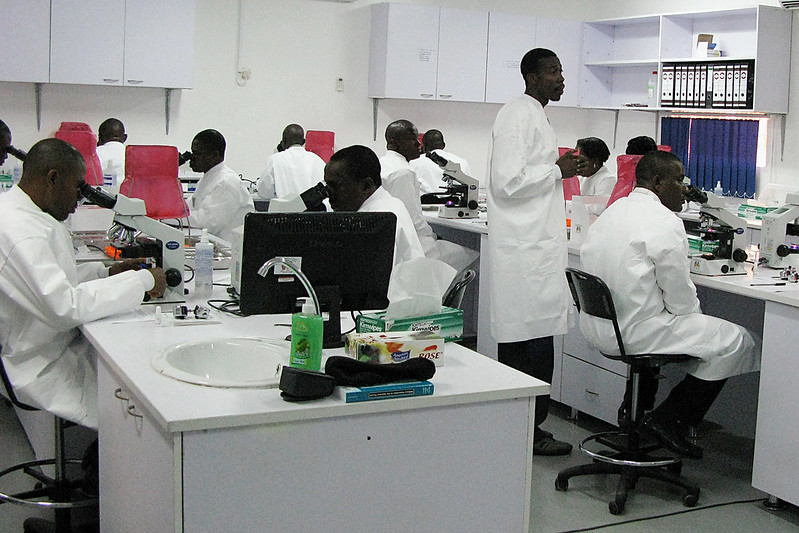The Wellcome Trust Tackles Neglected Tropical Diseases in Nigeria
 The Wellcome Trust is a global charity organization established in 1936 that focuses on research and providing support for mental and physical health challenges throughout the world. The organization specifically addresses neglected tropical diseases (NTDs) in Nigeria, such as Lassa fever, monkeypox and dengue. Through addressing NTDs, Wellcome Trust tackles complex health issues and contributes to socioeconomic development in Nigeria. Nigeria is home to the highest numbers and diversity of neglected tropical diseases throughout sub-Saharan Africa. To treat these diseases, it is necessary to prioritize research to diagnose those infected and implement treatment early on to minimize fatalities.
The Wellcome Trust is a global charity organization established in 1936 that focuses on research and providing support for mental and physical health challenges throughout the world. The organization specifically addresses neglected tropical diseases (NTDs) in Nigeria, such as Lassa fever, monkeypox and dengue. Through addressing NTDs, Wellcome Trust tackles complex health issues and contributes to socioeconomic development in Nigeria. Nigeria is home to the highest numbers and diversity of neglected tropical diseases throughout sub-Saharan Africa. To treat these diseases, it is necessary to prioritize research to diagnose those infected and implement treatment early on to minimize fatalities.
Addressing Lassa Fever
Lassa Fever, endemic to multiple African countries, hit Nigeria hard in 2018 with the country’s largest outbreak. More than 20% of cases were fatal. The disease infects blood vessels, attacking the organs. Only about 20% of cases show recognizable symptoms, complicating diagnosis and containment efforts. Currently, no vaccines exist for this potentially fatal disease, making research into diagnosis and treatment a critical priority.
The Wellcome Trust, a major supporter of infectious disease research, funds the Centre for Infectious Disease and Research Policy (CIDRAP), which has developed a plan to address Lassa Fever in Nigeria. This Research and Development (R&D) plan aims to advance vaccine research for various strains of the disease, identify gaps in current research and prioritize filling these gaps.
Working closely with the United Kingdom (U.K.) Department for International Development, these organizations have funded about £500,000 to the World Health Organization (WHO) and the African Coalition for Epidemic Research, Response and Training (ALERRT) to support Nigeria. This funding boosts projects that enhance research, expand access to laboratory work and benefit local clinics and health centers.
Addressing MPOX
Mpox (formerly known as monkeypox) is endemic in most African countries. A significant increase in cases occurred in Nigeria in 2017, prompting the WHO to enhance regulations to contain the disease. Like Lassa fever, Mpox presents various strains across different countries. Most cases arise in rural areas, often causing up to a two-week delay between symptom onset and treatment due to challenging access. To tackle this, the Wellcome Trust plans to collaborate with FIND, an organization developing a point-of-care rapid test to accelerate the diagnosis process on-site before verifying the data in a lab. Through this approach, the organization aims to reduce fatalities and decrease the stigma associated with this visibly impacting disease.
Addressing Dengue in Nigeria
Dengue, a viral disease spread by mosquitoes, is most prevalent in tropical climates. Diagnosed individuals suffer from high fevers, headaches and muscle and joint pains. The innovative research tool E-DENGUE enables local governments to prepare for outbreaks months in advance. According to the WHO, half of the world’s population is at risk of contracting dengue. E-DENGUE, currently a desktop platform, integrates data from various sources instead of relying solely on case studies. Researchers are working to develop this tool into a mobile app to enhance accessibility.
Urbanization, climate challenges and limited health care access complicate efforts to contain dengue, which is endemic in every state in Nigeria and ranks among the most fatally misdiagnosed diseases in Africa. The concern over dengue is often underestimated as health professionals struggle to accurately identify the disease. They lack consistent treatment methods due to insufficient tools and research.
Strategic Health Initiatives and Funding
The Trust has succeeded through research and community health programs that enhance awareness, prevention and treatment of diseases. Addressing these issues not only improves health and quality of life but also boosts economic benefits by increasing work productivity and reducing poverty. As of 2022, the Wellcome Trust plans to invest £16 billion in health research by 2032, focusing on discovery research, climate and health, infectious disease and mental health. It advances these areas by prioritizing research funding, advocating for global policy changes and fostering innovative research environments.
Looking to the Future
Since 2018, the Wellcome Trust and the Foreign, Commonwealth and Development Office (FCDO) have engaged in a productive collaboration through the Joint Initiative on Research in Epidemic Preparedness and Response (JIREP). This initiative funds research and medical support worldwide. The collaboration aims to tackle well-known diseases, assist countries in preparing for outbreaks and integrate social sciences and policy development in responding to global epidemics.
The Wellcome Trust’s strategies have significantly improved access to treatment and quality of life by enhancing research and funding for neglected tropical diseases in Nigeria. Furthermore, advances in technology have shortened diagnosis times, leading to quicker recoveries and fewer deaths. Indeed, this efficiency helps individuals resume work and daily activities, supporting their families and breaking the vicious cycle of poverty and disease.
– Lauren Sellman
Lauren is based in Rochester Hills, MI, USA and focuses on Good News and Global Health for The Borgen Project.
Photo: Flickr
